| Listing 1 - 7 of 7 |
Sort by
|
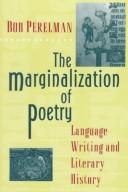
ISBN: 0691021384 Year: 1996 Publisher: Princeton (N.J.) : Princeton university press,
Abstract | Keywords | Export | Availability | Bookmark
 Loading...
Loading...Choose an application
- Reference Manager
- EndNote
- RefWorks (Direct export to RefWorks)
Language and languages in literature --- Langue et langues dans la littérature --- Poetics --- Poétique --- Poëtica --- Taal en talen in de literatuur --- American poetry --- Language and languages in literature. --- Poetics. --- History and criticism --- Theory, etc. --- 20th century
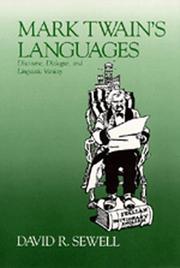
ISBN: 0520057023 Year: 1987 Publisher: Berkeley Los Angeles London University of California Press
Abstract | Keywords | Export | Availability | Bookmark
 Loading...
Loading...Choose an application
- Reference Manager
- EndNote
- RefWorks (Direct export to RefWorks)
Dialect literature [American ] --- Dialectliteratuur [Amerikaanse ] --- Language and languages in literature --- Langue et langues dans la littérature --- Littérature dialectale américaine --- Parole (Linguistique) dans la littérature --- Speech in literature --- Spraak in de literatuur --- Taal en talen in de literatuur --- Twain, Mark --- Language --- Knowledge --- Language and languages
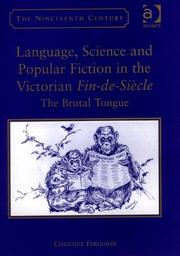
ISBN: 0754650820 9780754650829 9781315250861 9781351923316 9781138262805 Year: 2006 Volume: *91 Publisher: Aldershot Ashgate
Abstract | Keywords | Export | Availability | Bookmark
 Loading...
Loading...Choose an application
- Reference Manager
- EndNote
- RefWorks (Direct export to RefWorks)
Language and languages in literature --- Langue et langues dans la littérature --- Science in literature --- Sciences dans la littérature --- Taal en talen in de literatuur --- Wetenschappen in de literatuur --- English fiction --- English language --- Literature and science --- Popular literature --- History and criticism --- Style --- History --- 19th century --- Great Britain --- Germanic languages
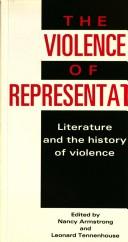
ISBN: 0415014484 0415014476 Year: 1989 Publisher: London Routledge
Abstract | Keywords | Export | Availability | Bookmark
 Loading...
Loading...Choose an application
- Reference Manager
- EndNote
- RefWorks (Direct export to RefWorks)
Sociology of literature --- Comparative literature --- Thematology --- Geweld in de literatuur --- Klassenstrijd in de literatuur --- Language and languages in literature --- Langue et langues dans la littérature --- Literature and politics --- Literature--Political aspects --- Literatuur en politiek --- Literatuur--Politieke aspecten --- Littérature et politique --- Littérature--Aspects politiques --- Lutte des classes dans la littérature --- Politics and literature --- Politics in literature --- Politiek en literatuur --- Politiek in de literatuur --- Politique dans la littérature --- Politique et littérature --- Social conflict in literature --- Sociale strijd in de literatuur --- Taal en talen in de literatuur --- Violence dans la littérature --- Violence in literature --- 82:32 --- Criticism --- -Politics and literature --- Political science in literature --- Literature --- Appraisal of books --- Books --- Evaluation of literature --- Literary criticism --- Rhetoric --- Aesthetics --- Style, Literary --- History --- -Political aspects --- Appraisal --- Technique --- Evaluation --- Language and languages in literature. --- Politics and literature. --- Politics in literature. --- Social conflict in literature. --- Violence in literature. --- -Language and languages in literature --- 82:32 Literatuur en politiek --- Political aspects --- 20th century
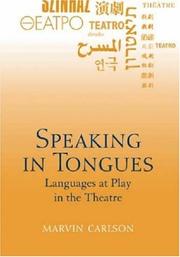
ISBN: 0472115472 9780472115471 Year: 2006 Publisher: Ann Arbor, Mich. University of Michigan Press
Abstract | Keywords | Export | Availability | Bookmark
 Loading...
Loading...Choose an application
- Reference Manager
- EndNote
- RefWorks (Direct export to RefWorks)
'Speaking in Tongues 'presents a unique account of how language has been employed in the theatre, not simply as a means of communication but also as a stylistic and formal device, and for a number of cultural and political operations. The use of multiple languages in the contemporary theatre is in part a reflection of a more globalized culture, but it also calls attention to how the mixing of language has always been an important part of the functioning of theatre. The book begins by investigating various "levels" of language-high and low style, prose and poetry-and the ways in which these have been used historically to mark social positions and relationships. It next considers some of the political and historical implications of dialogue theatre, as well as theatre that literally employs several languages, from classical Greek examples to the postmodern era. Carlson treats with special attention the theatre of the postcolonial world, and especially the triangulation of the local language, the national language, and the colonial language, drawing on examples of theatre in the Caribbean, Africa, Australia, and New Zealand. Finally, Carlson considers the layering of languages in the theatre, such as the use of supertitles or simultaneous signing. ' Speaking in Tongues' draws important social and political conclusions about the role of language in cultural power, making a vital contribution to the fields of theatre and performance. Marvin Carlson is Sidney E. Cohn Professor of Theatre and Comparative Literature, CUNY Graduate Center. He is author of 'Performance: A Critical Introduction'; T'heories of the Theatre: A Historical and Critical Survey, from the Greeks to the Present'; and 'The Haunted Stage: The Theatre as Memory Machine', among many other books.
Theatrical science --- anno 1900-1999 --- anno 2000-2099 --- Italy --- Deaf -- Interpreters for --- Deaf -- Translating services --- Doven -- Tolkdiensten --- Doven -- Tolken voor --- Gebarentaaltolken --- Interpreters for the deaf --- Interprètes pour les sourds --- Language and languages in literature --- Langue et langues dans la littérature --- Sign language interpreters --- Sourds --Traducteurs pour les --- Taal en talen in de literatuur --- Tolken in de gebarentaal --- Tolken voor doven --- Drama --- Dialect drama --- Dialect drama, Italian --- Experimental theater --- Experimental drama --- Theater --- History and criticism --- History --- Interpreters for the deaf. --- Language and languages in literature. --- History and criticism. --- Dialect drama [Italian ] --- 20th century --- Developing countries --- Deaf --- Deaf, Interpreters for --- Translators --- Avant-garde drama --- Literature, Experimental --- Alternative theater --- Avant-garde theater --- Dialect literature --- Criticism --- Translating services --- Means of communication --- Drama - History and criticism --- Dialect drama - History and criticism --- Dialect drama, Italian - History and criticism --- Experimental theater - History - 20th century --- Experimental drama - History and criticism --- Theater - Developing countries - History - 20th century --- Interpreters for deaf people
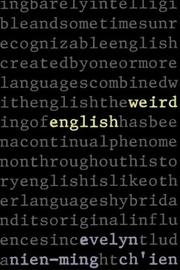
Abstract | Keywords | Export | Availability | Bookmark
 Loading...
Loading...Choose an application
- Reference Manager
- EndNote
- RefWorks (Direct export to RefWorks)
Gobbledygook --- Hybrid languages --- Jargons --- Language and languages in literature --- Languages [Mixed ] --- Langue et langues dans la littérature --- Langues hybrides --- Mengtalen --- Minderheden in de literatuur --- Minorities in literature --- Minorités dans la littérature --- Multiculturalism in literature --- Multiculturalisme dans la littérature --- Multiculturele samenleving in de literatuur --- Parole (Linguistique) dans la littérature --- Speech in literature --- Spraak in de literatuur --- Taal en talen in de literatuur --- American fiction --- Dialect literature, American --- Dialect literature, English --- English fiction --- English language --- Languages in contact --- Languages, Mixed --- Minorities as a theme in literature --- Mixed languages --- Pidgin languages --- Areal linguistics --- English literature --- English dialect literature --- American dialect literature --- American literature --- History and criticism --- Foreign elements --- Variation --- Dialects --- 20th century --- 21st century --- Dialect literature [American ] --- Dialect literature [English ] --- English-speaking countries --- Germanic languages
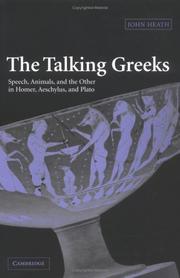
ISBN: 0521832640 9780521832649 9780511483011 9780521117784 0511111134 9780511111136 0511111460 9780511111464 0511483015 1280415584 9781280415586 052111778X 1107139309 9781107139305 0511181329 9780511181320 0511197950 9780511197956 0511299060 9780511299063 Year: 2005 Publisher: Cambridge Cambridge university press
Abstract | Keywords | Export | Availability | Bookmark
 Loading...
Loading...Choose an application
- Reference Manager
- EndNote
- RefWorks (Direct export to RefWorks)
When considering the question of what makes us human, the ancient Greeks provided numerous suggestions. This book argues that the defining criterion in the Hellenic world, however, was the most obvious one: speech. It explores how it was the capacity for authoritative speech which was held to separate humans from other animals, gods from humans, men from women, Greeks from non-Greeks, citizens from slaves, and the mundane from the heroic. John Heath illustrates how Homer's epics trace the development of immature young men into adults managing speech in entirely human ways and how in Aeschylus' Oresteia only human speech can disentangle man, beast, and god. Plato's Dialogues are shown to reveal the consequences of Socratically imposed silence. With its examination of the Greek focus on speech, animalization, and status, this book offers new readings of key texts and provides significant insights into the Greek approach to understanding our world.
Animals in literature --- Animals in poetry --- Animaux dans la littérature --- Animaux dans la poésie --- Beast epic --- Dieren in de literatuur --- Dieren in de poëzie --- Dierenepiek --- Dierenepos --- Dierenfabels --- Dierenromans --- Dierensprookjes --- Dierenverhalen --- Dieux grecs dans la littérature --- Difference (Psychology) in literature --- Differentie (Psychologie) in de literatuur --- Différence (Psychologie) dans la littérature --- Epopées animales --- Etres humains dans la littérature --- Fables ésopiques --- Goden [Griekse ] in de literatuur --- Gods [Greek ] in literature --- Human beings in literature --- Human-animal relationships in literature --- Language and languages in literature --- Langue et langues dans la littérature --- Man-animal relationship in literature --- Mens-dier relaties in de literatuur --- Mensen in de literatuur --- Parole (Linguistique) dans la littérature --- Relations homme-animal dans la litérature --- Speech in literature --- Spraak in de literatuur --- Taal en talen in de literatuur --- Greek literature --- Speech in literature. --- Human-animal relationships in literature. --- Difference (Psychology) in literature. --- Language and languages in literature. --- Gods, Greek, in literature. --- Human beings in literature. --- Animals in literature. --- Littérature grecque --- Parole dans la littérature --- Relations homme-animal dans la littérature --- Psychologie différentielle dans la littérature --- Langage et langues dans la littérature --- Homme dans la littérature --- History and criticism. --- Histoire et critique --- Aeschylus --- Homer --- Plato --- Littérature grecque --- Parole dans la littérature --- Relations homme-animal dans la littérature --- Psychologie différentielle dans la littérature --- Langage et langues dans la littérature --- Dieux grecs dans la littérature --- Homme dans la littérature --- Animaux dans la littérature --- Plato. --- Gods, Greek, in literature --- Man in literature --- History and criticism --- Aflāṭūn --- Aplaton --- Bolatu --- Platon, --- Platonas --- Platone --- Po-la-tʻu --- Pʻŭllatʻo --- Pʻŭllatʻon --- Pʻuratʻon --- Πλάτων --- אפלטון --- פלאטא --- פלאטאן --- פלאטו --- أفلاطون --- 柏拉圖 --- 플라톤 --- Homeros --- Homère --- Aischylos --- Eschilo --- Eschyle --- Eschylus --- Criticism and interpretation. --- Homerus --- Platon --- Platoon --- Criticism and interpretation --- Hóiméar --- Hūmīrūs --- Gomer --- Omir --- Omer --- Omero --- Ho-ma --- Homa --- Homérosz --- האמער --- הומירוס --- הומר --- הומרוס --- هومر --- هوميروس --- 荷马 --- Ὅμηρος --- Гамэр --- Hamėr --- Омир --- Homero --- 호메로스 --- Homerosŭ --- Homērs --- Homeras --- Хомер --- ホメーロス --- ホメロス --- Гомер --- Homeri --- Hema --- Pseudo-Homer --- Pseudo Omero --- Homer. --- Aeschylus. --- Платон --- プラトン --- Eskhil --- Esquilo --- Aiskhilos --- Eshil --- Æskílos --- Ajschylos --- Eschil --- Esḳilos --- Äschylos --- Eskili --- Aiszkhülosz --- Eschylos --- Iskilos --- Эсхил --- אייסכילוס --- איסכילאס --- איסכילוס --- إيسخولوس --- ايسخيلوس --- Αἰσχύλος --- Arts and Humanities --- History
| Listing 1 - 7 of 7 |
Sort by
|

 Search
Search Feedback
Feedback About UniCat
About UniCat  Help
Help News
News